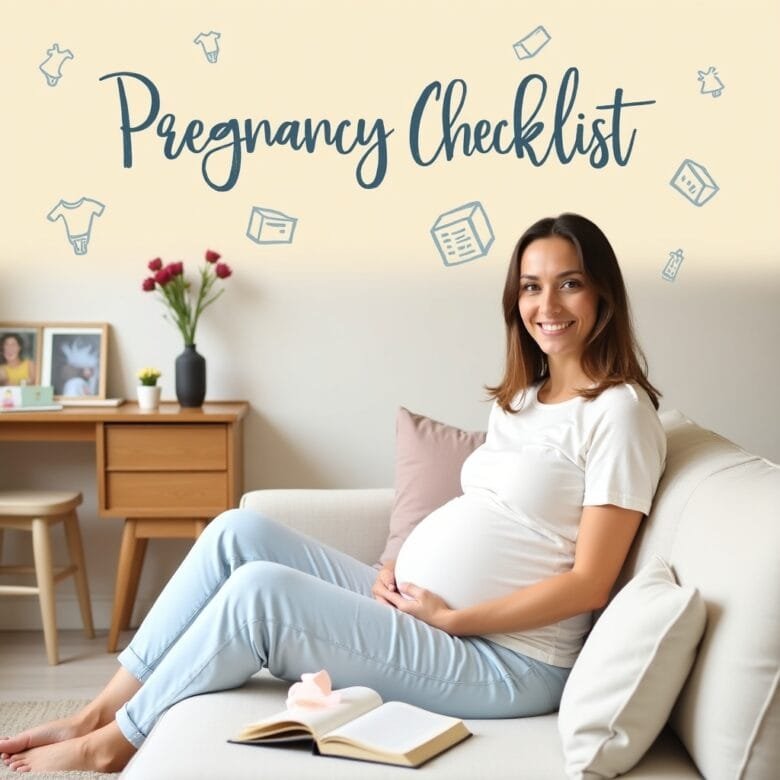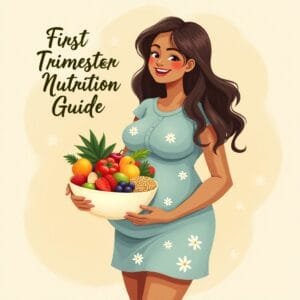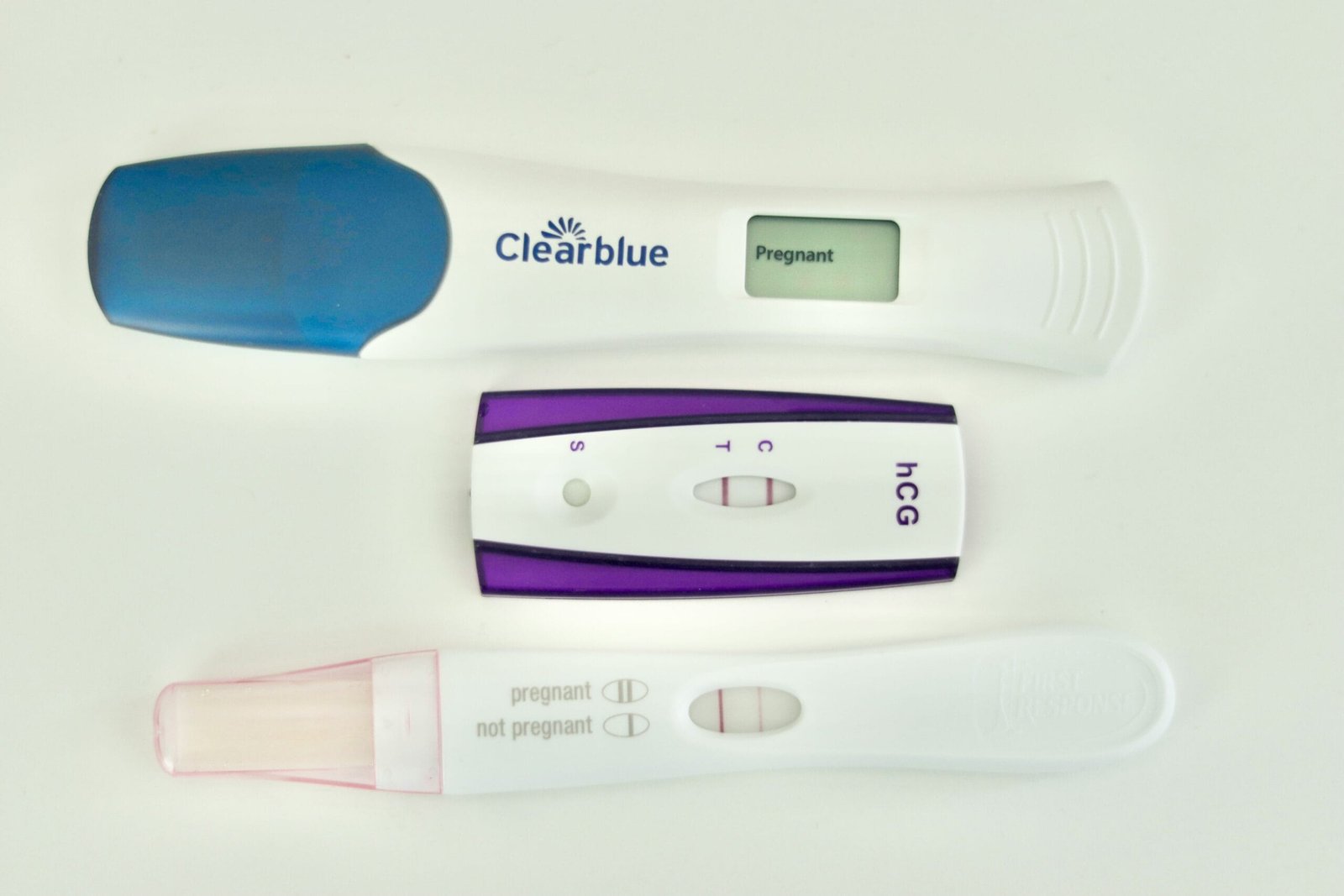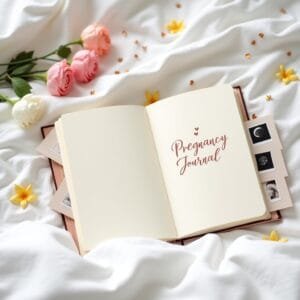Pregnancy is an exciting journey, but it can quickly feel overwhelming with so many appointments, vitamins, and preparations to keep track of. From tracking your prenatal care to planning for labor and beyond, staying organized is key to ensuring both you and your baby stay healthy and stress-free throughout these critical months.
A comprehensive pregnancy checklist helps you cover all the essentials from routine medical checkups and prenatal supplements to preparing your home, planning your maternity wardrobe, and even thinking ahead about your birth plan. By following a clear guide, you can focus on enjoying your pregnancy while making sure nothing important is overlooked.
First Trimester Essentials
The first trimester of pregnancy is a pivotal time for expectant mothers, marked by significant physical and emotional changes. A well-prepared pregnancy checklist can aid in ensuring a healthy beginning. Among the must-have essentials for this period, prenatal vitamins stand out as a crucial item. These vitamins typically contain folic acid, which is vital for the healthy development of the fetus and can help prevent neural tube defects.
Morning sickness can be challenging for many women during this initial phase of pregnancy. To ease symptoms, remedies such as ginger tea, peppermint lozenges, and acupressure wristbands can be beneficial. Integrating these options into daily routines can provide comfort and alleviate nausea, thereby promoting better nutritional intake.
As the body begins to change, comfortable clothing becomes essential for physical well-being. Opt for loose-fitting garments made from soft, breathable fabrics to accommodate the increasing sensitivity and changes in body shape. Maternity wear, even in its early stages, can help expectant mothers feel more comfortable and confident during this transitional phase.
Hydration is another critical aspect of maintaining health in the first trimester. Pregnant women should aim to drink more fluids to combat potential dehydration caused by morning sickness and to support increased blood volume. Keeping a reusable water bottle handy can serve as a reminder to hydrate throughout the day.
In addition to these physical necessities, emotional support is paramount during this time fraught with uncertainty. Engaging with supportive friends, family, or a pregnancy group can provide comfort and reassurance. By incorporating these essentials into a cohesive pregnancy checklist, expectant mothers can better navigate the early stages of their journey toward motherhood, promoting a smooth transition into the subsequent trimesters.
Read More: Best Teas for Pregnant Women | Safe Pregnancy Herbal Teas
Second Trimester Must-Haves
As expectant mothers enter the second trimester, they often experience a newfound sense of energy and comfort. This stage is a pivotal point in the pregnancy journey where preparation becomes key. A comprehensive pregnancy checklist focusing on must-have essentials for every trimester, especially this one, will ensure that both mother and baby are well taken care of.
The need for comfortable and supportive maternity wear becomes increasingly important during the second trimester. Expectant mothers can benefit from clothing specially designed to accommodate their changing bodies. Look for breathable fabrics, flexible waistbands, and stylish options that provide both comfort and practicality. Well-chosen maternity wear allows women to feel confident and at ease throughout the day, making it a staple on any pregnancy checklist.
Another essential item to consider is a body pillow. These large, supportive pillows help alleviate discomfort by providing support to the back, hips, and abdomen during rest. A good night’s sleep is crucial for a mother’s well-being, and investing in a body pillow can ease physical strain and enhance overall comfort as the pregnancy progresses.
Furthermore, skincare products that target stretch marks deserve attention during this trimester. As the skin stretches to accommodate the growing baby, it is vital to maintain its elasticity and hydration. Look for creams or oils rich in vitamins and targeted for pregnancy, as they can help minimize the appearance of stretch marks and promote skin health.
Lastly, having a prenatal checkup planner ensures that expectant mothers keep track of their appointments and important milestones during this phase. Regular checkups allow healthcare providers to monitor the baby’s development and address any concerns that may arise. Following a carefully devised pregnancy checklist not only paves the way for a healthier pregnancy experience but also fosters a sense of preparedness for the future.
Third Trimester Necessities
As the third trimester approaches, it is essential for expectant mothers to focus on preparation, both physically and emotionally, for the upcoming birth. This pivotal stage involves gathering crucial items that will aid in a smoother transition into motherhood. A well-curated pregnancy checklist can significantly ease the stress associated with preparing for childbirth and the early days that follow.
One of the fundamental essentials for this trimester is the hospital bag. This bag should be packed in advance and include items such as comfortable clothing, toiletries, and any personal items that make you feel at ease. Items like a blanket, a pair of slippers, and a phone charger can also contribute to your comfort during your hospital stay. Additionally, a birthing plan should be drafted, outlining your preferences and requirements for labor and delivery. This document can serve as a helpful guide for healthcare providers, ensuring that your needs are recognized and respected during this important time.
Moreover, breastfeeding supplies are another essential category to consider during this period. Nursing pads, breast pumps, and comfortable nursing bras should be included in the preparation for breastfeeding. Establishing a breastfeeding routine early can help ease the transition into feeding your newborn. Furthermore, consider relaxation and pain management tools such as birthing balls or heating pads, which can provide comfort as you approach labor.
In conclusion, the third trimester is a crucial time to prioritize preparation for childbirth. Gathering must-have essentials, including a well-packed hospital bag, a detailed birthing plan, and breastfeeding supplies, coupled with relaxation tools, will facilitate a more positive birthing experience. By attending to these details in advance, expectant mothers can focus on their emotional readiness as they await the arrival of their little one.
Read More: Getting Pregnant Checklist: Your Comprehensive Guide to Conception
Postpartum Care Essentials
The postpartum period is a critical time for new mothers, necessitating careful attention to both physical and emotional recovery. By preparing a thorough pregnancy checklist, mothers can ensure they have the necessary resources to facilitate a smoother transition into motherhood. This checklist should include physical recovery essentials, emotional support items, breastfeeding aids, and general baby care necessities.
Physical recovery is paramount after childbirth. Essential items include maternity pads, which are designed to manage postpartum bleeding, and comfortable underwear that accommodates the body’s changes. Additionally, a perineal bottle can aid in hygiene and comfort during recovery. Many mothers find that sitz baths are beneficial for soothing sore areas and promoting healing. Also, investing in a quality breast pump can be crucial for managing milk supply and address any breastfeeding challenges.
Emotional support also plays a significant role during the postpartum phase. New mothers may experience a range of emotions from elation to anxiety. Therefore, creating a supportive environment is vital. Consider including items like a journal for emotional expression, a stress-relief pillow, or a resourceful parenting book that offers guidance. Connecting with a local support group can greatly enhance emotional well-being during this transformative phase.
Breastfeeding aids should also be part of your pregnancy checklist. Items such as nipple cream can help alleviate discomfort, while breast pads keep clothing dry. A nursing pillow can provide additional comfort during feeding sessions, helping to establish a smooth breastfeeding routine. Furthermore, ensure to have a variety of baby care essentials ready, including diapers, wipes, and a changing pad. Essential hygiene items, such as baby-safe soap and lotions, are necessary to maintain your newborn’s delicate skin.
In conclusion, the postpartum period can be overwhelming, but with a well-prepared checklist, mothers can navigate this life change with greater ease. By prioritizing physical recovery, emotional well-being, and essential baby care, new mothers can support themselves during this crucial period of adjustment. Remember, each item on your pregnancy checklist is not just a necessity; it’s a stepping stone towards a healthier and more positive motherhood experience.
Nurturing Your Baby: Newborn Essentials
Preparing for the arrival of a newborn can be both an exciting and overwhelming experience for new parents. Having a well-thought-out pregnancy checklist that includes must-have essentials for every trimester is crucial for ensuring that parents feel ready and supported when the baby arrives. Among the most important items to include are clothing, feeding supplies, diapering essentials, and sleeping arrangements.
When it comes to baby clothing, it’s wise to choose soft, comfortable fabrics and versatile styles. Basic items like onesies, sleep sacks, and pajamas in different sizes will accommodate your growing baby. You should also consider seasonal needs, ensuring you have adequate layers for warmth or sun protection. Remember, newborns can go through multiple outfits each day, so having sufficient clothing can help ease the burden on parents during those first few weeks.
Feeding supplies are another key aspect of the newborn essentials. Whether you choose to breastfeed or formula feed, having the right items on hand is essential. If breastfeeding, consider investing in a high-quality breast pump, nursing pads, and a comfortable nursing pillow. For formula feeding, essentials include bottles, nipples, and a sterilizer for hygiene. Feeding can be a significant bonding experience, so being prepared will enhance the overall experience for both baby and parent.
Diapering items also deserve careful consideration. You will need a reliable stock of diapers, wipes, and a changing pad. Some parents find it helpful to have a diaper bag packed and ready for outings. A comfortable diaper disposal system will also contribute to maintaining a fresh environment in the nursery.
Lastly, prioritize safe sleeping arrangements. A crib or bassinet that meets safety standards, along with fitted sheets, will provide a secure space for your baby to rest. Creating a calm and nurturing atmosphere is important for promoting better sleep for both the baby and parents. By preparing these essentials in advance, parents can welcome their baby with confidence, greatly enhancing comfort for the entire family during the first few months.
Financial Planning for Parenthood
Preparing for a baby involves various financial considerations that are essential to ensure a healthy transition into parenthood. One of the first steps expectant parents should take is to establish a comprehensive budget that accounts for the significant expenses associated with pregnancy and newborn essentials. This budgeting should include costs related to prenatal care, baby gear, and postpartum recovery.
Firstly, prenatal care typically consists of regular doctor visits, ultrasounds, and various medical tests. These costs can vary widely depending on health insurance coverage and geographic location. Therefore, it is crucial to verify your insurance policy and understand what is covered; this will provide clarity on out-of-pocket expenses. Next, consider the necessary baby gear—items such as cribs, strollers, and car seats can add up quickly. While many essentials can be purchased new, exploring second-hand options or borrowing from friends and family is advisable, potentially saving significant amounts of money.
The postpartum period also requires financial preparation. New parents may face additional costs such as diapers, formula, and breastfeeding supplies. Furthermore, unexpected expenditures may arise during this time, including medical bills or infant care costs. Setting aside a contingency fund can help buffer against these unanticipated expenses.
To effectively manage the financial landscape of impending parenthood, it is beneficial to seek out cost-saving strategies. Utilizing coupons, subscribing to baby product subscription services, and participating in community programs can provide opportunities to save. Additionally, creating a detailed financial plan that includes a clear outline of anticipated expenses can aid in prioritizing what items are most necessary during each trimester.
By encompassing these considerations in your pregnancy checklist, you can navigate the financial commitments of expanding your family with a greater sense of preparedness and confidence.
Mental Health and Support Systems
During pregnancy, mental health is a critical aspect that often requires just as much attention as physical health. Hormonal changes, the anticipation of becoming a parent, and various societal pressures can lead to increased levels of stress and anxiety. It is essential for expectant mothers to recognize that they are not alone in experiencing these emotions. Building a solid support system is integral for maintaining mental equilibrium throughout pregnancy and after childbirth.
Establishing a support system can begin with family and friends. Open communication with loved ones can help alleviate feelings of isolation, allowing pregnant individuals to express their worries and seek advice. Joining prenatal classes or mother support groups can also create a sense of community and understanding. These groups provide an invaluable resource for sharing experiences, discussing challenges, and fostering friendships during this transformative time.
In addition to social support, various strategies can aid in managing stress and anxiety during pregnancy. This may include mindfulness practices, yoga, or meditation, which help cultivate a state of mental calmness. Regular exercise, adhering to a well-balanced diet, and ensuring proper sleep can further enhance overall mental well-being. Pregnant individuals should also consider professional counseling services if feelings of anxiety or depression become overwhelming. Many counseling services specialize in maternal mental health, providing tailored support to address unique challenges faced during this period.
Moreover, maintaining mental health is vital not only during pregnancy but also in the postpartum phase. Recognizing the signs of postpartum depression and seeking help from healthcare providers can ensure that new parents receive the necessary care. Overall, prioritizing mental well-being through supportive relationships and effective coping strategies plays a crucial role in having a fulfilling pregnancy experience, enabling individuals to embrace motherhood with confidence.
Creating a Personalized Pregnancy Checklist
Creating a personalized pregnancy checklist is an essential step for expectant parents to ensure they are prepared for the journey ahead. As each pregnancy is unique, tailoring a checklist to individual needs will serve to create a more organized and stress-free experience. To begin, it is important to evaluate specific requirements based on personal lifestyle, previous pregnancies, and any medical advice provided by healthcare professionals. This personalized approach will culminate in a checklist that is both relevant and practical.
Consider categorizing the checklist based on the three trimesters, as each stage comes with its own set of must-have essentials. For example, the first trimester may require items like prenatal vitamins, pregnancy books, and basic maternity wear, while the second might introduce necessities such as a pregnancy pillow or specialized skincare products. The final trimester, on the other hand, should focus on preparations for childbirth, including a hospital bag, baby essentials, and home supplies. By dividing the pregnancy checklist into trimesters, you will have a clearer picture of what you need and when you will need it.
Tracking progress is another critical aspect of your pregnancy checklist. Regularly reviewing and updating the list can help manage tasks effectively, whether it’s marking off items you have already obtained or adding new essentials that arise as your pregnancy progresses. Encouraging your partner and family members to be involved in this process can foster a supportive environment. Their participation not only lightens the load but also helps create lasting memories as you prepare for the arrival of your little one. This collaborative effort ensures that every essential is accounted for, fortifying the family bond during this significant time.
Conclusion
A pregnancy checklist is an essential tool for expectant parents to stay organized and ensure maternal and fetal health. Tracking prenatal appointments, nutrition, baby preparation, and lifestyle adjustments promotes confidence and reduces stress. By using a structured checklist, parents can navigate pregnancy with clarity, maintain healthy habits, and prepare effectively for a positive birthing experience.
FAQs
What is a pregnancy checklist?
A pregnancy checklist is a guide that helps expectant parents track appointments, nutrition, lifestyle adjustments, and baby preparation tasks throughout pregnancy.
Why is a pregnancy checklist important?
It ensures important prenatal care, vaccination schedules, and healthy lifestyle habits are not missed, supporting both maternal and fetal wellbeing.
What should be included in a pregnancy checklist?
Key items include prenatal doctor visits, supplements, pregnancy-safe exercise, nutrition planning, baby essentials, and labor preparation.
How often should I update my pregnancy checklist?
It’s helpful to review and update your checklist each trimester to track changing needs, appointments, and baby growth milestones.
Can a pregnancy checklist reduce stress?
Yes, having a clear plan helps parents stay organized, reduces anxiety about forgetting important tasks, and promotes a smoother pregnancy experience.



